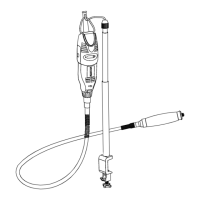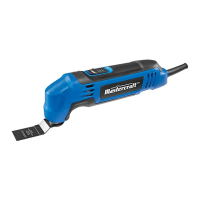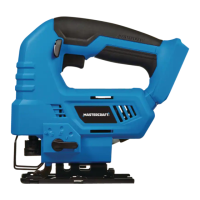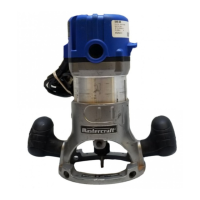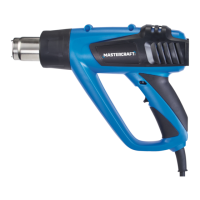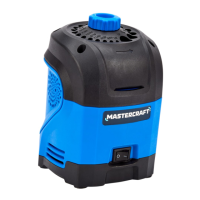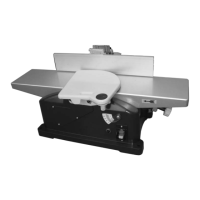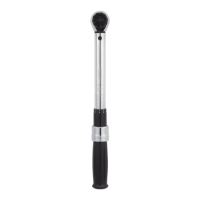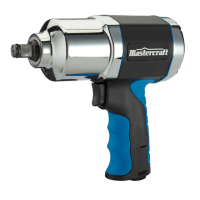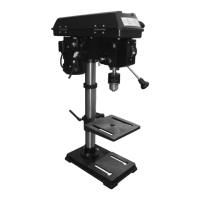EXPLODED VIEW OF NOZZLES
Contents
Carefully unpack the heat gun. Compare against
the “HEAT GUN COMPONENTS” chart below.
WARNING: To avoid re
or toxic reaction, never use gasoline, naphtha,
acetone, lacquer thinner or similar highly volatile
solvents to clean the tool.
14
Heat gun applications
The heat gun is a tool that can be used for
many different applications. As with any power
tool, there are many factors that will affect its
effectiveness and safety. It is important to be
aware of these factors before you begin to use
the tool. The chart below illustrates examples
of several heat gun applications and the ideal
temperature settings.
Application
Temperature
setting
Removing adhesive backed
oor coverings
Low
Removing paint High
Drying paint or plaster Low
Heating electrical shrink tube Low
Heating shrink wrap Low
Thawing frozen locks Low
Thawing frozen metal water
pipes
High
Loosening seized bolts & nuts High
Molding and bending plastics Low
Waxing skis & snowboards Low
Sealing ends of nylon or
polypropylene rope
Low
Heating applications are affected by several
factors. The density of the material being heated,
ambient temperature, wind, distance between
the nozzle and the surface being heated and
the heating technique will all affect the speed at
which the surface will be heated.
During the heating process, it is very important to
maintain a consistent distance between the nozzle
and the surface being heated.
NOTE: The nozzle must be at least 2”
(25 mm) from the surface being heated to permit
adequate air ow and to prevent overheating.
Always keep the heat gun in motion during the
heating process. Inadequate motion will result in
overheating and possible damage to the surface
or to the heat gun.
15
HEAT GUN COMPONENTS
KEY DESCRIPTION QTY
A Heat gun 1
B Nozzle (coned reducer) 1
C Nozzle (curved head shield) 1
D Nozzle (air wrap) 1
E Scraper (at blade) 1
F Scraper handle 1
G Nozzle (wide jet) 1
H Blow molded case 1
I Scraper blade (concave) 1
J Scraper blade (isosceles) 1
K Scraper blade (convex) 1
Owner’s manual 1
Have you read “POWER TOOL SAFETY”,
“SPECIFIC SAFETY RULES”, EXTENSION
CORD SAFETY” and “SYMBOLS” on pages
5 through 12 of this Manual? If not, please
do it now before you operate this heat gun.
Your safety depends on it!
Every time you use the heat gun you should
verify the following:
1. The nozzle is not obstructed with
debris
2. Appropriate safety glasses, respirator
mask and protective clothing are
being won
3. Area adjacent to the heating
application is clear of all combustible
materials
4. Availability of water or re
extinguisher in case of a re.
Failure to adhere to these safety rules can
greatly increase the chances of injury or
property damage.
WARNING
HEAT GUN 054-1252-6
HEAT GUN 054-1252-6
OPERATING INSTRUCTIONS
CONTENTS
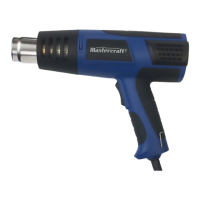
